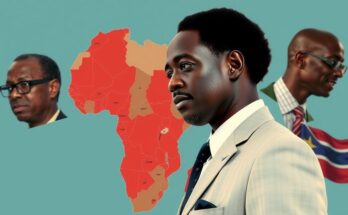On October 9, Uganda celebrated 62 years of independence from British rule, highlighting its historical journey toward self-governance, political turmoil, and subsequent recovery under President Yoweri Museveni. The country’s evolving relationship with Egypt underscores regional cooperation and shared interests.
On October 9, Uganda celebrated its 62nd Independence Day, a significant milestone commemorating the nation’s liberation from British colonial rule in 1962. The celebrations took place at Kololo Independence Grounds where thousands gathered to honor the historical moment marked by the lowering of the British Union Jack and the ascending of the Ugandan flag, a symbol of national pride with its colors of black, yellow, and red. The transition of power was officiated by the Duke of Kent, representing Queen Elizabeth II, who entrusted the Instruments of Power to Dr. Milton Obote, Uganda’s first Prime Minister. The path to independence was fraught with challenges, beginning with a rise in political consciousness from 1940 to 1954. Ugandans rallied for representation on the Legislative Council, leading to the inclusion of key national leaders in 1945. Efforts by movements such as the Batakabbu, spearheaded by Ignatius Musaazi, were pivotal in advocating for the rights of indigenous peoples and access to financial resources. The formation of political entities like the Uganda National Congress in 1952 and the Democratic Party in 1954 marked major steps toward self-governance. Following the Namirembe Agreement in 1955 and the expansion of the Legislative Council in 1958, Uganda moved toward self-rule, culminating in elections in 1962 that heralded independence. Despite a peaceful transfer of power, Uganda’s political history post-independence has been turbulent, characterized by coups, dictatorships, and civil unrest, which have severely impacted national stability and development. The legacy of colonialism left deep-seated ethnic divisions and economic fragility that challenged successive leaders. Notably, conflicts arose primarily from the differing interests between Baganda monarchists and other ethnic groups. Various regimes, including the authoritarian rule of Idi Amin, plagued Uganda with human rights violations and political repression. By the time the National Resistance Movement (NRM) assumed power in 1986 under President Yoweri Museveni, the nation was on the verge of collapse. The NRM introduced extensive reforms targeting insecurity, economic recovery, and social welfare, which have reportedly resulted in significant economic growth and improved living standards since its inception. The achievements underline a stark contrast to the instability experienced in previous decades, pushing Uganda toward greater regional peace and international recognition. Moreover, Uganda’s role in humanitarian efforts, particularly its commendable refugee hosting policies, has gained international acknowledgment. Under the Museveni administration, Uganda has become a notable advocate for African unity and collaboration, often compared to prominent historical figures due to his diplomatic engagements on the continent.
This article explores Uganda’s journey toward independence beginning with political awakening in the 1940s, leading to the significant event of October 9, 1962, when the country officially became independent from British colonial rule. The discourse offers insights into the political turmoil experienced in the decades following independence, including conflicts among ethnic groups and authoritarian regimes that struggled for power. It also highlights Uganda’s economic revival and international stature in regional peacebuilding and humanitarian efforts, particularly under the leadership of President Yoweri Museveni. Additionally, the article touches upon the evolving relationship between Uganda and Egypt, emphasizing their mutual interests and collaborative efforts.
In summary, Uganda’s 62 years since independence encapsulate resilience amid adversity, marked by significant political, economic, and social transformations. The historical context illustrates the nation’s struggles for self-governance, the lasting impact of colonial legacies, and the strides made toward stability and development. Concurrently, the partnership with Egypt highlights Uganda’s strategic regional role and emphasizes the importance of international cooperation in confronting shared challenges and fostering mutual growth.
Original Source: www.dailynewsegypt.com




